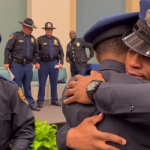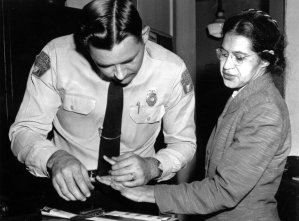By Greg Garrison | ggarrison@al.com
This is another installment in Birmingham Times/AL.com joint series “Beyond the Violence: what can be done to address Birmingham’s rising homicide rate.” Sign up for the newsletter here.
What makes a 20-year-old, fresh out of high school, sign up to be a police officer in the city with the highest number of homicides in Alabama?
“Ever since I was young, I always felt a calling to protect people,” said Officer Carson Franklin, 20, who was sworn in on Friday after graduating from the Birmingham Police Academy.
Franklin, a graduate of Sumiton Christian School, said he and the other new recruits all know the job can mean putting your life on the line.
“Everybody in the class knew what we signed up for,” Franklin said. “We’re here to work, and we’re here to do our job. We’re excited to get out there and do it.”
The Birmingham Police Academy graduation ceremony on Dec. 9 revealed a glimpse of a mostly hidden problem: there aren’t enough new officers joining the force. Four new officers were sworn in: Franklin, Imani Dumas, Jacob Hendrix and Darreyon Johnson.
“We’re very proud to have these new men,” Birmingham Police Chief Scott Thurmond said.
All four hope to do their part to fight crime.
“I’m just going to do my best to help out,” said Officer Dumas, 25, a Homewood High School graduate, wiping away the tears that flowed after an emotional graduation when he hugged a long line of family and friends proud to see him wear that badge.
“My reason is simply to protect the community, and kids in school,” Dumas said.
While the new graduates were celebrated and welcomed to the Birmingham Police Department, the size of the class raises some qualms about the future of a force facing a staffing crisis as the city approaches the possibility of setting a record this year for the most homicides in Birmingham history.
“It’s important that we continue to recruit, that we continue to renew the blood of the police department, continue to have new officers out there to serve our citizens every day,” Thurmond said after the ceremony.
In this job, there’s an extra level of scrutiny, pressure and yes, danger.
“It’s challenging, but it’s also probably one of the most rewarding professions, to be able to get out and actually help somebody, save somebody’s life, to make a difference in someone’s life,” Thurmond said. “That’s what is the best part of this profession.”
Over recent years, academy classes are getting smaller, from two dozen or more graduates to single digits. It has reached the point where the training staff of instructors, capable of training 45 recruits in a class, may now outnumber the trainees.
Thurmond said the December class is the smallest Birmingham Police Academy graduating class since he joined the force in 1998. “The class started with more, but some didn’t make it through for various reasons,” he said.
The training is rigorous and it’s common for some who start to fail or drop out.
“Of course, we need to get more,” Thurmond said. “It’s a trend across our nation right now. It’s not just the City of Birmingham. All of our municipalities are short to some degree.”
As the Birmingham Police Department shrinks by attrition, with as many as 30 to 60 officers leaving each year, there are not adequate numbers of new police officers coming in to take their places.
“We’re continuing to recruit and work hard, work with the city to recruit new officers to serve the citizens of Birmingham,” Thurmond said.
‘We have a crisis’
While Thurmond isn’t panicking, others are alarmed.
“We have a crisis,” said State Rep. Allen Treadaway, a former assistant chief who retired from the Birmingham Police in 2020 after 31 years.
Birmingham leads Alabama cities in the number of killings, with more than 135 homicides this year and more likely by the end of the year, threatening the city’s record of 141 set in 1991.
In 2011, when the city had 57 homicides, there were at least 200 more patrol officers on the streets than there are now, Treadaway said.
The Birmingham Police Department is funded for 1,091 employees, same as last year, with funding for 720 sworn officers, in the city’s 2023 fiscal year budget that runs from July 1, 2022, to June 30, 2023.
The budget included increases for $6.6 million more in police salaries, increases in their pension and new uniforms, along with $2.7 million for 10 days of police overtime during the World Games in July.
The budget included a raise for city employees and a 5 percent merit and longevity pay increase.
While the department has what city officials believe is a sufficient budget, adequate staffing remains the question. It has been difficult to find enough new officers to fill the positions that are already funded.
“The numbers of police officers are short,” said Sgt. Otis Luke, president of the Fraternal Order of Police Lodge 1 in Birmingham. “We are experiencing shortages in having the number of police officers we need, just as other police departments nationwide are experiencing shortages.”
The FOP has complained about the working conditions for officers who are forced to cover more hours and more territory with fewer badges on the streets.
The blue line has been stretched too thin, they say.
“This is not a profession a lot of people are willing to take on at this time,” said FOP Vice President D’Angelo Hall, a Birmingham police officer who will take over as FOP president in January. “It has its ups and downs. Working for the city has good benefits.”
In October, the FOP released a statement to media saying that Birmingham only has about 500 officers and fewer than 350 available for patrol. City officials have declined to confirm that estimate or release numbers on how many sworn officers are currently available for patrol. “Releasing our current staffing level would negatively impact our day-to-day operations,” Thurmond said.
Backlash
The difficulty in finding and keeping police officers has many contributing factors.
The 2020 Black Lives Matter protests of the George Floyd killing by Minneapolis police resulted in nationwide calls for defunding police. A negative perception of police has been a challenge even longer, notably since the police shooting of Michael Brown in 2014 in Ferguson, Mo., which was followed by riots and protests against law enforcement.
“It probably started more with Ferguson,” Thurmond said. “It has elevated as things have gone on, with time. George Floyd was just the latest, unfortunately.”
Those incidents in Minnesota and Missouri, and others, have reverberated nationwide.
“It has had an impact on law enforcement across the board,” Thurmond said.
The effects of COVID, while hard to explain, have also undermined police recruiting.
“Regardless of the profession, jobs are short (on candidates),” Thurmond said. “Whether it be a restaurant or wherever. It’s not just law enforcement. I don’t know where everybody went. Many people are working from home for different reasons, using computers.”
While critics have hammered police misconduct, research shows good police work can reduce crime.
Hiring police officers in general may lead to reductions in crime and investments in policing may be more efficient than investments in prisons, according to research published by University of Pennsylvania criminologists Jacob Kaplan and Aaron Chalfin. Investments in law enforcement are unlikely to increase state prison populations and may lead to a decrease, they found, and investments in policing may yield a “double dividend” to society by reducing incarceration and crime rates. They found that adding one new police officer on average statistically correlated to reducing homicides between .06 and 0.1 homicides per year.
By that math, it would take 10 to 17 more officers on the street to have one fewer homicide per year, although the factors that lead to violent crime are too many to oversimplify and police officers cannot prevent most homicides from happening. What they can do is take those known to be violent, such as felons with outstanding warrants, off the streets before they commit more crimes. That’s hard for an understaffed police force to focus on when it’s overwhelmed by daily routine 911 calls for service, with Birmingham handling as many calls in a month as Shelby County gets in a year.
“Who is going after the repeat violent felons?” Treadaway said.
While police abuse of power and misconduct will always be a concern, good officers want the bad ones to be weeded out, and Birmingham overall has done a good job of that, Treadaway said. The department has changed over the decades to better racially reflect its community, going from an all-white police force in the 1960s to about 70 percent African-American officers now, he said.
While Birmingham Mayor Randall Woodfin has emphasized a variety of programs for long-term crime prevention by investing in education, housing, employment opportunities and conflict resolution programs, he has also repeatedly said that in conversations with the community, citizens say they want more of a police presence, not less.
But the backlash against police from highly publicized cases such as the Floyd incident have made it harder to recruit future police officers.
“We’ve demonized law enforcement,” Treadaway said. “It’s messed with the psyche of police officers.”
Danger
It’s a tough sell, since urban police work is dangerous and underappreciated, and officers are being overworked and suffering from low morale, not exactly big selling points for young people making a career choice.
“I’ve lost eight close buddies,” officers killed in the line of duty, Treadaway said. “I can’t tell you how many were shot and were saved by UAB Hospital’s trauma center.”
In many cases criminals are better armed than the police and don’t fear or respect them, said community activist Gwen Webb, the second Black female officer for the Birmingham Police Department, who was with the force from 1975-87.
She stays in contact with police officers and praised those who remain loyal and have deep pride in the uniform and community service.
“Their safety is my big concern,” Webb said. “Morale is low. We’re not going to get the proper protection because they’re overworked and underpaid.”
Birmingham and other police departments in Jefferson County hire from a list provided by the Jefferson County Personnel Board. But that list of available potential officers has been shrinking for years, from more than 1,000 to several hundred.
When the homicide rate is high, blame tends to fall on the police chief. Thurmond took over this year after the departure of embattled former Chief Patrick Smith.
“You can put Superman in the job right now,” Treadaway said. “If you don’t have the staffing, you can’t do it.”
Woodfin has said that FOP complaints about staffing should be addressed with the chief.
“Birmingham Police has an adequate number of officers to patrol the city,” Woodfin said in a prepared statement. “Recently the department moved to 12-hour shifts which have enhanced coverage for each precinct. The 12-hour shift is a common strategy for departments in the Birmingham metro region. Chief Thurmond recently announced Operation Close Out, which utilizes seasonal crime data to strategically address needs as we approach the end of the year.”
Ad blitz?
Recruiting new police officers should be a major priority, Treadaway said.
Drastic recruitment measures may be needed, including brash advertising campaigns to encourage young people to consider a career in law enforcement.
The first of those was unveiled on Monday, when the city announced a $5,000 signing bonus for new officers.
By the nature of the job, not just anyone can be a police officer. Those with criminal records or even unpaid parking tickets may have trouble enrolling at a police academy. There are physical requirements, such as being able to scale a 6-foot fence and climb through a 2-foot-by-2-foot window. Pay for officers typically falls in the $38,000 to $60,000 range.
The city could also focus on recruiting officers from other departments who are already certified, although the reverse tends to happen, with suburban departments often recruiting and poaching from the ranks of trained Birmingham officers.
“As departments across the region and country focus on efforts to recruit more officers, the city continues to address ways to retain and recruit officers in Birmingham,” Woodfin said. “We look forward to announcing additional recruitment strategies in the near future.”
The Birmingham Police Academy’s Dec. 9 graduating class of four future police officers did not stir much hope for filling the void.
“We need more, I’ll put it to you like that,” said Officer Hall of the FOP. “Four is not enough to replace the people that we’re losing.”
In the past, the Birmingham Police Academy’s 20-week program graduated as many as 96 police cadets in a single class, although that was when the academy also did training for Bessemer and other departments that now opt for the state’s shorter 12-week course.
Unless dramatic action is taken soon, the problem of shorthanded law enforcement means the criminals could have an edge on the streets, Treadaway said.
“You have a perfect storm,” he said. “Don’t expect it to get better.”
Since Birmingham has its own police academy, it can overlap and ramp up training.
“We have another class that’s actively going right now,” Thurmond said. “We have another class that’ll be starting in February. We are constantly running academy classes. That’s one advantage Birmingham has is by having our own police academy, we can continue to run them at our own pace and speed.”
Looking for recruits
For those interested in becoming Birmingham police officers, the next Birmingham Police Academy training session begins Feb. 14 and ends June 30, 2023. Deadline for application is Jan. 13, 2023.
“If they’ll call (205) 254-1712, our hiring team will get them on board,” Thurmond said.
See also: ‘It’s a dry forest’ with men throwing matches: A history of homicide in Birmingham
For more stories in the series go here.










